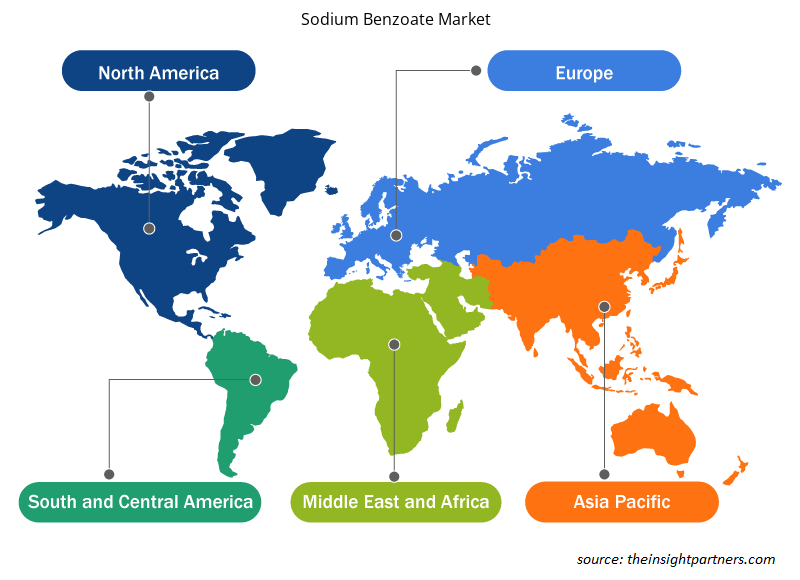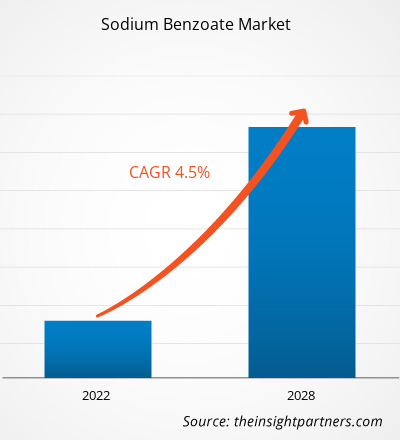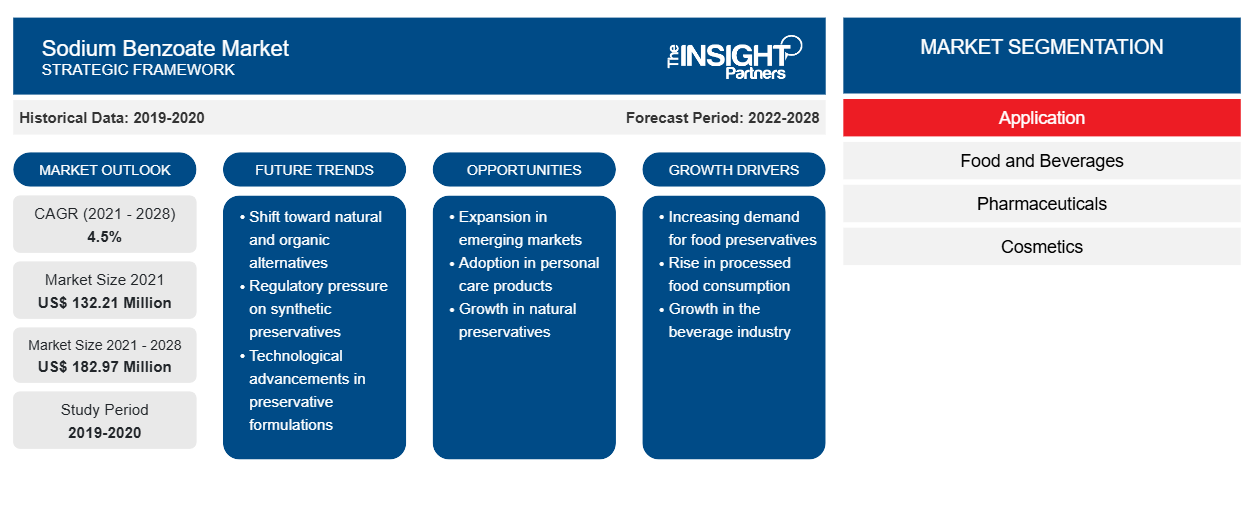[Forschungsbericht] Der Markt für Natriumbenzoat soll von 132.214,6 Tausend US-Dollar im Jahr 2021 auf 182.965,2 Tausend US-Dollar im Jahr 2028 anwachsen; für den Zeitraum 2021–2028 wird ein durchschnittliches jährliches Wachstum von 4,5 % erwartet.
In verschiedenen Endverbraucherbranchen wie Lebensmittel und Getränke, Kosmetik, Textilpflege und Pharmazeutika steigt die Nachfrage nach Konservierungsmitteln, was den Bedarf an Natriumbenzoat weiter erhöht . Die wachsende Nachfrage nach Konservierungsmitteln zur Verbesserung der Haltbarkeit verschiedener Lebensmittel trägt zur starken Nachfrage nach Natriumbenzoat in der Lebensmittel- und Getränkeindustrie bei. Darüber hinaus treibt die weltweit steigende Nachfrage nach Kosmetikprodukten das Wachstum des Natriumbenzoatmarktes voran . In der Kosmetikindustrie besteht eine hohe Nachfrage nach Konservierungsmitteln, um die Qualität des Produkts zu verbessern und seine Haltbarkeit zu verlängern, was den Bedarf an Natriumbenzoat voraussichtlich ankurbeln wird . Die Kosmetikunternehmen konnten weltweit weiterhin ihre Marktanteile ausbauen, insbesondere in den Schwellenländern. Laut dem Bericht der Federation of Beauty Companies ( FEBEA ) beispielsweise beliefen sich die französischen Kosmetikexporterlöse im Jahr 2021 auf 18,1 Milliarden US-Dollar, was einem Anstieg von 2,5 % gegenüber 2019 entspricht. Die oben genannten Faktoren treiben die Nachfrage nach Natriumbenzoat an .
Im Jahr 2020 hatte der asiatisch-pazifische Raum den größten Anteil am globalen Natriumbenzoatmarkt und wird im Prognosezeitraum voraussichtlich die höchste durchschnittliche jährliche Wachstumsrate (CAGR) auf dem Markt verzeichnen. Der asiatisch - pazifische Raum umfasst China , Indien, Japan, Australien, Südkorea und den Rest des asiatisch-pazifischen Raums . Die Bevölkerung der asiatisch-pazifischen Länder wie China und Indien ist am schnellsten. Die Automobil-, Verpackungs-, Bau-, Körperpflege- sowie Lebensmittel- und Getränkeindustrie entwickelt sich im asiatisch-pazifischen Raum mit der wachsenden Bevölkerung rasant. Etablierte Sektoren wie Lebensmittel und Getränke, Kosmetik, Körperpflege und Pharmazeutika haben die Nachfrage nach Natriumbenzoat in der Region erhöht.
Passen Sie diesen Bericht Ihren Anforderungen an
Sie erhalten kostenlose Anpassungen an jedem Bericht, einschließlich Teilen dieses Berichts oder einer Analyse auf Länderebene, eines Excel-Datenpakets sowie tolle Angebote und Rabatte für Start-ups und Universitäten.
-
Holen Sie sich die wichtigsten Markttrends aus diesem Bericht.Dieses KOSTENLOSE Beispiel umfasst eine Datenanalyse von Markttrends bis hin zu Schätzungen und Prognosen.
Auswirkungen der COVID-19-Pandemie auf den Natriumbenzoatmarkt
Die COVID-19-Pandemie hatte gemischte Auswirkungen auf den Natriumbenzoatmarkt . Zunächst hatte COVID-19 aufgrund des Rückgangs der Produktion erhebliche Auswirkungen auf den Markt. Die Verhängung von Lockdown -Maßnahmen führte zur Einstellung der Produktionstätigkeiten, was zu einem Rückgang der Lieferaktivitäten führte. Darüber hinaus erschwerten Reisebeschränkungen auf der ganzen Welt den Transport von Rohstoffen, was das Wachstum der Weltwirtschaft bremste. Es wird jedoch erwartet, dass die COVID-19-Pandemie in den kommenden Jahren langfristig positive Auswirkungen auf den Markt haben wird. Der Ausbruch führte zu einem Anstieg der verpackten Lebensmittel, da sich die Verbraucher zunehmend der Hygiene und Sicherheit von Produkten bewusst wurden und daher den Kauf von Lebensmitteln mit sicherer Verpackung bevorzugten. Da Natriumbenzoat in vielen verpackten Lebensmitteln als Konservierungsmittel verwendet wird, begünstigte das Wachstum der Produktion verpackter Lebensmittel den Markt. Darüber hinaus erlebte der Markt aufgrund der plötzlichen Auswirkungen der Pandemie einen Boom bei der Nachfrage nach Produkten, die die Immunität in der Pharma- und Nutraceutikaindustrie stärken . Die Pharmaindustrie ist eine der wichtigsten Anwendungsbranchen für den Natriumbenzoatmarkt . Infolgedessen stieg auch der Verbrauch von Natriumbenzoat sprunghaft an. Um der steigenden Nachfrage nach diesen Nahrungsergänzungsmitteln gerecht zu werden, konzentrierten die Hersteller ihre Bemühungen darauf, ihre Verkaufsstrategien zu verbessern und das Produkt in unerschlossene Märkte zu bringen.
Markteinblicke
Steigende Nachfrage nach Natriumbenzoat in der Lebensmittel- und Getränkeindustrie
Natriumbenzoat ist das Natriumsalz der Benzoesäure . Es wird in der Lebensmittel- und Getränkeindustrie häufig als Konservierungsmittel und Einlegemittel verwendet. Es wird von der Food and Drug Administration (FDA) allgemein als sicher anerkannt und kann in Lebensmitteln in einer Konzentration von bis zu 0,1 Gewichtsprozent verwendet werden. Natriumbenzoat wird in säurehaltigen Lebensmitteln wie Salatdressings, kohlensäurehaltigen Getränken, Pickles, Marmeladen und Fruchtsäften, Gewürzen und Toppings für gefrorenen Joghurt verwendet, um Verderb durch schädliche Mikroorganismen wie schädliche Bakterien, Hefen und Schimmel zu verhindern. Es hilft auch, die Frische von Lebensmitteln zu bewahren, indem es Farb-, Geschmacks-, pH- und Texturveränderungen verlangsamt oder verhindert. Darüber hinaus wirkt es als bakteriostatisches und fungistatisches Konservierungsmittel in Erfrischungsgetränken und anderen Getränken, was den säuerlichen Geschmack verstärkt und die Haltbarkeit des Produkts verlängert. Natriumbenzoat wird häufig als Konservierungsmittel verwendet, um den Geschmack zu schützen. Die Coca-Cola Company verwendet es auch als antimikrobielles Mittel in Coca-Cola-Getränken.
Anwendungseinblicke
Basierend auf der Anwendung ist der globale Natriumbenzoatmarkt in Lebensmittel und Getränke, Pharmazeutika, Kosmetika, Landwirtschaft und andere unterteilt. Im Jahr 2020 machte das Segment Lebensmittel und Getränke den größten Umsatzanteil aus. Die Nachfrage nach Natriumbenzoat steigt in der Lebensmittel- und Getränkeindustrie aufgrund veränderter Kundenpräferenzen für verpackte Lebensmittel und Getränke und eines höheren Pro-Kopf-Einkommens erheblich an. In vielen Ländern hat die zunehmende Tendenz, Mahlzeiten wie das Frühstück auszulassen, zu einem Anstieg der Nachfrage der Verbraucher nach verarbeiteten und verpackten Lebensmitteln und Getränken geführt.benzoate market is segmented into food and beverages, pharmaceuticals, cosmetics, agriculture, and others. In 2020, the food and beverages segment accounted for the largest revenue share. The demand for sodium benzoate is increasing substantially in the food & beverages industry due to changes in customer preferences for packaged food and beverages and higher per capita income. In many countries, the increasing tendency to skip meals, such as breakfast, has led to a rise in consumers' demand for processed and packaged food and beverage products.
Eastman Chemical Company; Foodchem International Corporation; AM FOOD CHEMICAL CO., LIMITED; Jarchem Innovative Ingredients LLC; MERCK KGaA; LANXESS; Akema Srl; Zancheng Life Sciences Ltd.; FBC Industries; und Reagents gehören zu den wichtigsten Akteuren auf dem Markt. Diese Unternehmen bieten dem Markt ein breites Produktportfolio. Die Unternehmen sind in den Entwicklungsregionen vertreten, was lukrative Möglichkeiten für das Marktwachstum bietet. Die Marktteilnehmer entwickeln qualitativ hochwertige und innovative Produkte, um die Anforderungen der Kunden zu erfüllen.
Regionale Einblicke in den NatriumbenzoatmarktBenzoate Market Regional Insights
Die regionalen Trends und Faktoren, die den Natriumbenzoatmarkt während des Prognosezeitraums beeinflussen, wurden von den Analysten von Insight Partners ausführlich erläutert. In diesem Abschnitt werden auch Natriumbenzoatmarktsegmente und -geografie in Nordamerika, Europa, im asiatisch-pazifischen Raum, im Nahen Osten und Afrika sowie in Süd- und Mittelamerika erörtert.Benzoate Market throughout the forecast period have been thoroughly explained by the analysts at Insight Partners. This section also discusses Sodium Benzoate Market segments and geography across North America, Europe, Asia Pacific, Middle East and Africa, and South and Central America.

- Erhalten Sie regionale Daten zum NatriumbenzoatmarktBenzoate Market
Umfang des Marktberichts zu Natriumbenzoat
| Berichtsattribut | Details |
|---|---|
| Marktgröße im Jahr 2021 | 132,21 Millionen US-Dollar |
| Marktgröße bis 2028 | 182,97 Millionen US-Dollar |
| Globale CAGR (2021 - 2028) | 4,5 % |
| Historische Daten | 2019-2020 |
| Prognosezeitraum | 2022–2028 |
| Abgedeckte Segmente |
Nach Anwendung
|
| Abgedeckte Regionen und Länder |
Nordamerika
|
| Marktführer und wichtige Unternehmensprofile |
|
Marktteilnehmerdichte für Natriumbenzoat: Auswirkungen auf die Geschäftsdynamik verstehenBenzoate Market Players Density: Understanding Its Impact on Business Dynamics
Der Markt für Natriumbenzoat wächst rasant, angetrieben durch die steigende Nachfrage der Endverbraucher aufgrund von Faktoren wie sich entwickelnden Verbraucherpräferenzen, technologischen Fortschritten und einem größeren Bewusstsein für die Vorteile des Produkts. Mit steigender Nachfrage erweitern Unternehmen ihr Angebot, entwickeln Innovationen, um die Bedürfnisse der Verbraucher zu erfüllen, und nutzen neue Trends, was das Marktwachstum weiter ankurbelt.Benzoate Market market is growing rapidly, driven by increasing end-user demand due to factors such as evolving consumer preferences, technological advancements, and greater awareness of the product's benefits. As demand rises, businesses are expanding their offerings, innovating to meet consumer needs, and capitalizing on emerging trends, which further fuels market growth.
Die Marktteilnehmerdichte bezieht sich auf die Verteilung von Firmen oder Unternehmen, die in einem bestimmten Markt oder einer bestimmten Branche tätig sind. Sie gibt an, wie viele Wettbewerber (Marktteilnehmer) in einem bestimmten Marktraum im Verhältnis zu seiner Größe oder seinem gesamten Marktwert präsent sind.
Die wichtigsten auf dem Natriumbenzoatmarkt tätigen Unternehmen sind:Benzoate Market are:
- Eastman Chemical Company
- Foodchem International Corporation
- AM FOOD CHEMICAL CO., LIMITED
- Jarchem Innovative Ingredients LLC
- MERCK KGaA
Haftungsausschluss : Die oben aufgeführten Unternehmen sind nicht in einer bestimmten Reihenfolge aufgeführt.

- Überblick über die wichtigsten Akteure auf dem NatriumbenzoatmarktBenzoate Market top key players overview
Bericht-Spotlights
- Fortschrittliche Branchentrends auf dem Natriumbenzoatmarkt helfen den Akteuren bei der Entwicklung wirksamer langfristiger Strategienbenzoate market to help players develop effective long-term strategies
- In Industrie- und Entwicklungsländern angewandte Strategien für Unternehmenswachstum
- Quantitative Analyse des Natriumbenzoatmarktes von 2019 bis 2028benzoate market from 2019 to 2028
- Schätzung der weltweiten Nachfrage nach Natriumbenzoatbenzoate
- Porters Fünf-Kräfte-Analyse zur Veranschaulichung der Wirksamkeit von Käufern und Lieferanten in der Branche
- Aktuelle Entwicklungen zum Verständnis des wettbewerbsorientierten Marktszenarios
- Markttrends und -aussichten sowie Faktoren, die das Wachstum des Natriumbenzoatmarktes vorantreiben und bremsenbenzoate market
- Unterstützung im Entscheidungsprozess durch Aufzeigen von Marktstrategien, die das kommerzielle Interesse untermauern und zum Marktwachstum führen
- Die Größe des Natriumbenzoatmarktes an verschiedenen Knotenpunktenbenzoate market size at various nodes
- Detaillierte Übersicht und Segmentierung des Marktes sowie der Dynamik der Natriumbenzoat-Industriebenzoate industry dynamics
- Größe des Natriumbenzoatmarktes in verschiedenen Regionen mit vielversprechenden Wachstumschancenbenzoate market in various regions with promising growth opportunities
Die „Globale Natriumbenzoat-Marktanalyse bis 2028“ ist eine spezialisierte und eingehende Studie der Chemie- und Materialindustrie mit besonderem Schwerpunkt auf der globalen Natriumbenzoat-Markttrendanalyse. Der Bericht soll einen Überblick über den Markt mit detaillierter Marktsegmentierung geben. Der Natriumbenzoat-Markt ist nach Anwendung und Geografie segmentiert. Nach Anwendung ist der Natriumbenzoat-Markt in Lebensmittel und Getränke, Pharmazeutika, Kosmetika, Landwirtschaft und andere unterteilt. Nach Geografie ist der Markt grob in Nordamerika, Europa, Asien-Pazifik (APAC), Naher Osten und Afrika (MEA) sowie Süd- und Mittelamerika segmentiert.
Firmenprofile:
- Eastman Chemical Company
- Foodchem International Corporation
- AM FOOD CHEMICAL CO., LIMITED
- Jarchem Innovative Ingredients LLC
- MERCK KGaA
- LANXESS
- Akema Srl
- Zancheng Life Sciences Ltd.
- FBC Industries
- Reagenzien
- Historische Analyse (2 Jahre), Basisjahr, Prognose (7 Jahre) mit CAGR
- PEST- und SWOT-Analyse
- Marktgröße Wert/Volumen – Global, Regional, Land
- Branchen- und Wettbewerbslandschaft
- Excel-Datensatz
Aktuelle Berichte
Erfahrungsberichte
Grund zum Kauf
- Fundierte Entscheidungsfindung
- Marktdynamik verstehen
- Wettbewerbsanalyse
- Kundeneinblicke
- Marktprognosen
- Risikominimierung
- Strategische Planung
- Investitionsbegründung
- Identifizierung neuer Märkte
- Verbesserung von Marketingstrategien
- Steigerung der Betriebseffizienz
- Anpassung an regulatorische Trends























 Kostenlose Probe anfordern für - Natriumbenzoat-Markt
Kostenlose Probe anfordern für - Natriumbenzoat-Markt